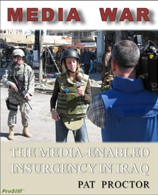Media War: The Media-Enabled Insurgency in Iraq – Book Review
 Media War: The Media-Enabled Insurgency in Iraq by Lt. Col. Pat Proctor (ProSIM Company, Inc.); Kindle Edition, $4.95
Media War: The Media-Enabled Insurgency in Iraq by Lt. Col. Pat Proctor (ProSIM Company, Inc.); Kindle Edition, $4.95
It is often said that the pen is mightier than the sword. This statement often goes hand in hand with another, which is that history is taught by the winners. The former statement certainly is true as the embedded media can record, report on and offer its version of history before any troops return home. Thanks to the changing role of the media, the history is all too often written as it happens – and should the media not like what they see, the historical record can be all the more damning.
{default}The result is in line with yet another statement about war, which is that the first casualty is often the truth.
Lieutenant Colonel Pat Proctor, US Army, experienced much of this first hand, and in his book Media War: The Media-Enabled Insurgency in Iraq he provides his concise view of how the media on the ground, as well as half a world away, were able to control the court of public opinion in the war in Iraq.
To understand this, Proctor notes comparisons to the Vietnam War, which was arguably the first war fought in the living rooms of America, as the nightly news brought the conflict into viewer’s homes each evening. Thus battles could be reported on as they happened, and every action was judged by the viewing public. Proctor writes, “If one accepts the widely held belief that the Tet Offensive was the turning point in the Vietnam War, the point at which America began losing the war, the implications for Iraq are sobering.”
In the digital era it now appears that wars may only be fought on the battlefield, but thanks to the embedded media, edited, condensed, and uploaded in ever increasing speed. Proctor offers the insightful opinion that this was a war fought not just between the U.S. military and the insurgency in Iraq following the U.S. led invasion in 2003, but also between the U.S. military and the insurgency for the will of the American people to actually win the war. In the end the U.S. military lost.
The sad truth, which Proctor demonstrates in this newly released Kindle book (available for download) from Amazon.com, is that this was not a war that fought badly, with poor planning, nor was the U.S. military driven out. The truth is that the invasion of Iraq was a controversial decision, and Proctor shows that the media essentially made it nearly impossible for it to succeed, as the U.S. military and the insurgents fought not just each other but to influence the coverage they received.
Along the way the book offers a detailed look at the role of various media personnel – from full-time reporters to stringers to freelancers – all looking to break that story that no one else had gotten yet. The writer further explains that the changing model of news in America also changed the coverage of said news. While the traditional networks offer two news segments a day – the morning shows and the evening news – which allowed for a story to be created, complete with commentary and context, 24-hour news channels further changed the game. For the all-the-time news outlets – as well as the Internet – this became an endless cycle of coverage, often times with the reporters offering their own commentary and often with misrepresented context thrown into the mix. How could the U.S. military possibly win the war while winning the hearts of minds of not the Iraqis but the Americans back home?
Protor’s work isn’t the most engaging read, in fact it offers so much detail that a background in news operations is almost required to understand some of the key facets. It is however a fascinating book that news junkies will appreciate deeply, albeit one that delves far deeper into the subject that most casual readers would ever dare tread. Hopefully, it is also a book that will take some of the power away from those who wield the pen.


Evidently a denial of reality here. The person most responsible for the mistakes in Iraq was Donald Rumsfeld. Of course he had co-enablers. He is not called the worst Defense Secretary for no reason.